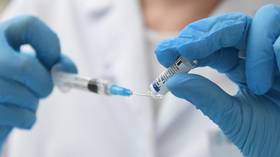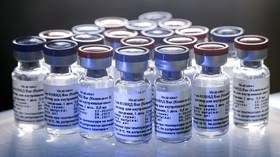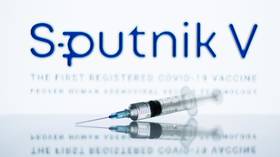Developers explain why Sputnik V seems to be better at tackling Omicron than Pfizer

The head of Moscow's Gamaleya National Center of Epidemiology and Microbiology, which created the Sputnik V Covid-19 vaccine, and the boss of the fund that bankrolled its development, have spoken to RT about a fresh study that has found the jab to be much more effective against the Omicron variant than the German-American Pfizer formula.
A comparative Italian-Russian paper, published earlier this week, revealed that Sputnik V was 2.6 times better in tackling Omicron than the popular Western alternative.
Sputnik V has shown a more-than-eightfold reduction of virus-neutralizing activity against the new super-mutant coronavirus strain, in contrast to a 21.4-fold drop for the Pfizer vaccine, according to the study by Italy’s Lazzaro Spallanzani National Institute for Infectious Diseases and the aforementioned Gamaleya Center. The paper also said Sputnik Light, a one-shot version of the product, provided significantly increased virus-neutralizing activity against Omicron when used as a booster.
The Sputnik V and Pfizer vaccines offered almost equally strong protection against the original Covid-19, but the Russian jab turned out to be more effective against the new version because “it provides a wider spectrum of virus-neutralizing antibodies for various changing variants of the coronavirus, which will keep popping up in the future,” Alexander Gintsburg, the director of the Gamaleya Center, told RT.
His experts had been considering possible mutations of the virus from the start, and their warnings were taken into account in the design of Sputnik V, Gintsburg pointed out. “Meanwhile, mRNA vaccines [like Pfizer] were developed to only give high protection against the [original] Wuhan strain of Covid-19 and related antigen variants.”
The laboratory survey, carried out by the Italian and Russian virologists, was “very representative and conclusive, but it’s up to the doctors on the frontline to dot the i’s,” he added. In around a week, Russian medial officials will share the number of Sputnik V recipients who have been hospitalized with Omicron. Initial reports suggest that none of them have required in-patient treatment so far, and “let’s hope that this trend continues,” he added.
The publication of the survey, revealing Sputnik’s superiority over Pfizer in the face of Omicron, wasn’t an attack on the rival jab, Kirill Dmitriev, the head of the Russian Direct Investment Fund (RDIF), which financed the development of the Russian vaccine and now oversees its distribution, insisted.
“It’s not a competitive message – it’s a message of cooperation,” Dmitriev said. “We believe that the Sputnik and Pfizer shots will work well together,” he pointed out, adding that the American formula was included in the study just for reference – due to itself having “pretty good results” against Omicron.
Russia is offering the Sputnik Light one-shot jab as a universal booster to many other vaccines to strengthen and lengthen immune response to Omicron, the RDIF boss pointed out.
According to Gintsburg, those who were revaccinated with Sputnik Light had 100% protection from the new variant three months after their shots.
Despite boasting high efficacy and being supplied to more than 70 countries, Sputnik V still lacks approval from the World Health Organization (WHO) and the EU's watchdog, the European Medicines Agency (EMA).
But Dmitriev hoped that after the study – involving the Spallanzani Institute, which is “the top viral institute in Italy” – has proven it to be so effective against Omicron, “regulators now will recognize the promise of Sputnik.”
There’ve been many attempts to undermine the Russian jab in the Western media, but “we have to listen to science; and the science is clear: Sputnik is the best vaccine against Omicron,” he insisted.













